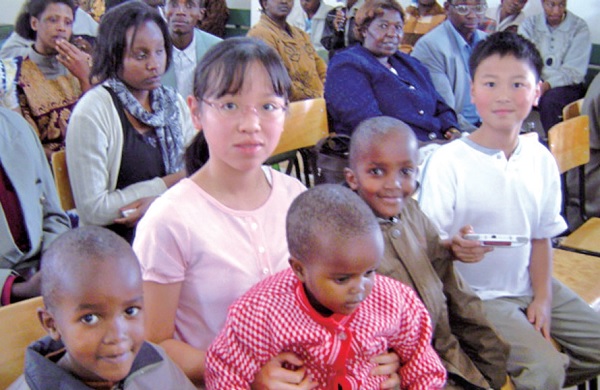The hunky boy turns into a big man
Building a Young Generation from John Mark

▲How to cultivate the younger generation at home and in the church to become elite soldiers in the kingdom of Christ?
Cultivate and perfect
The seven-year-old child said, "I want to be a doctor when I grow up!" The mother was very happy to hear this. He went on to say, "I want to go to Africa as a missionary and treat the poor people there!" Mom's joy immediately turned to sadness.
If your child says this, how would you respond? Cultivation and perfection, or was he so wary of missionary work that he gave up on this idea?
Family counseling generally focuses on "healing childhood with a lifetime"; giving children a sense of mission and direction from an early age can "heal a lifetime with childhood." When cultivating the younger generation, how to "create a pattern" for them instead of "picking up the pieces" in the future?
Let’s take a look at how a young boy in the Bible became a man.
John Mark, the author of the Gospel of Mark, according to research, the home where he grew up was the upper room where the 120 disciples gathered to pray before Pentecost. It was later called "Mark's Tower". Some scholars believe that the place where Jesus had the last supper also belongs to Mark's parents. He is considered a second-generation rich man and grew up in a family with a favorable financial and spiritual environment. He was timid, or rather clever; when Jesus was captured, he ran away naked.
When he grew up, he was determined to serve and followed Paul and Barnabas to the church in Antioch, and also followed them on their first missionary journey. The first stop at Cyprus (Cyprus) had limited gospel effect and encountered great spiritual warfare. After leaving there, we took a boat to Perga and continued on the difficult and dangerous mountain road to Pisidian Antioch. At this time, the team leader changed from Barnabas to Paul; the leadership style changed from gentle encouragement to strong driving. Marco couldn't bear the hardship, so he went home. Does this mean that the purpose and meaning of his life stop here?
Counseling and leadership from spiritual elders
How did this second-generation rich man, who was timid and afraid of hardship, become the author of the Gospel and an effective co-worker of the leaders of the early church? His family environment is uniquely endowed with believers and spiritual leaders often gathering together, allowing him to expand his horizons. The first generation of family members communicated and passed on the old, middle-aged, young and young generations, so that they had Paul as their teacher, Peter as their father, and Barnabas as their brother. Their leadership, tolerance, and support are the best nutrients for his spiritual growth.
Let’s look at Paul first. He doesn't care about life and death, difficulties, or being rejected by others; he treats everything as rubbish and regards Christ as the most precious thing; as long as it is right, he does not hesitate to offend authority and criticize and correct him face to face. I believe that his sense of mission and values, as well as his unreserved strength and sacrifice for the Lord, deeply influenced Mark, who followed him in his service.
Peter opened a new page in cross-cultural missionary work. He was passionate and impulsive, spoke and acted without consideration, and denied the Lord three times. After meeting the resurrected Lord, his life was transformed. From then on, he became powerful in preaching, missionary work, and leading the church. I believe he influenced Mark, broadened his spiritual horizons, and expanded his ministry pattern.
Paul was very concerned about Mark's escape during his first missionary journey. Barnabas, the "son of comfort", persisted in parting ways with Paul, put aside the fruits of his first missionary trip, and concentrated on "missionary work" to Mark alone in order to rebuild the young people.
For young people in families and churches, we must allow them the opportunity to make mistakes and look back, help them laugh at their own and others’ mistakes, and find the motivation to rebuild in their failures. Promote, train, and empower the younger generation, and provide a platform for service. Talent needs to be discovered and cultivated. The inheritance of service requires teaching through words and deeds, conveying mission and values, and also requires waiting and nurturing in grace.
The Hunboy Makeover
The faith of Christians under the Roman Empire was severely tested, and Mark stayed with Peter in Rome. The young man who ran away in the desert now decided to stay in Rome regardless of danger.
Mark was with Paul when Paul was first imprisoned in Rome; Paul was imprisoned again and asked Timothy to bring Mark with him when he came to Rome, thinking that Mark would be beneficial to the preaching ministry. Former missionary deserters are now elite soldiers of the Kingdom of God, reminding us to give young people another chance.
Co-workers are not afraid of disputes or misunderstandings, but they are most afraid of not being able to tolerate, forgive, and reconcile each other. At first, Paul had a big quarrel with Barnabas because he opposed Mark's joining the second missionary mission. Later, he accepted the changed Mark and prospered the gospel together.
Disagreement is inevitable in service, but it does not have to be hostility. Co-workers can become more powerful witnesses by living out the gospel they preach, admitting their mistakes, correcting each other, asking for forgiveness, and treating each other with kindness.
Mark, who grew up and matured, wrote the down-to-earth Gospel of Mark in Greek, translated the Aramaic language used by most Jews, and explained Jewish customs so that Gentiles could understand it. He later went to Egypt to preach and was later called "Mark the Evangelist" (Mark the Evangelist). He established the first church in Alexandria and was martyred here in 68 AD. The gospel spread rapidly in Egypt, with a large number of believers. The Alexandrian Church became one of the five major churches in early Christianity. During the patristic era, many outstanding theologians appeared in the Alexandrian church. The Copts in Egypt today are the largest Christian population in the Middle East and North Africa and the largest religious minority group in the region, accounting for approximately 10-15% of Egypt's population.
Who would have thought that Mark, who failed to complete his first missionary journey, would leave such a glorious page in the history of missions? ! How can we adjust our perspective on the young co-workers around us who have not yet matured, see their spiritual potential, and allow them to develop their character through exercise?

▲John Mark, the author of the Gospel, became a great man in the Kingdom of God under the company, support, and construction of his spiritual elders. The picture shows Mark's portrait in "The Four Evangelists" by Frans Hals, a 16th-century Dutch painter.
Deliberately Raising Christian Soldiers
When cultivating the character of children and young co-workers, we should teach them to be as docile as doves, "gentle, courteous, thrifty and accommodating", and as nimble as snakes, to know how to fight, be able to fight, and dare to fight when faced with challenges to their beliefs, culture, and values. How to feed and shepherd children and spiritual descendants to become a fighting group with a sense of mission and true soldiers of Christ?
Examine whether you have given them too high or wrong expectations. To expect young people to "grow into talents", they must first become healthy people in Christ, only then can they glorify God, benefit others, and benefit themselves when they achieve success. First become a "person" and then become a "talent"; if the "person" is wrong, how can you develop your "talent" for God?
Recently, the suicide rate among 15-24 year olds has increased year by year, and the number of people under 30 years old taking antidepressant drugs has also increased year by year. The generation with one mobile phone (smartphone) has experienced complex interpersonal relationships prematurely in virtual social circles. When problems with self-identity arise, but without practical help, the ability to deal with frustrations and emotions has dropped significantly. Families and churches need to create a safe environment for spiritual big brothers and little brothers, big sisters and little sisters to interact without delay.
How do parents and spiritual elders treat young people so much that they become self-centered? Or let them learn loyalty from small things and see their own responsibility in the needs of others? Adults often use love in the name of making children the "kings" of the family and the church, covering up the consequences of their mistakes so that they have no sense of right and wrong. Or families and churches should use appropriate boundaries and rewards and punishments to allow them to learn to admit their mistakes, be forgiven, and experience the grace of another chance.
Whether you are local or far away, missionary to the same culture or a different culture, you need to take the initiative to interact with people and build friendships. This requires deliberate cultivation and training. Why not lead young people to plan, prepare, and promote starting from community services or short-term missionary charity sales? Selling under the sun, what you gain with your sweat is not only valuable experience, but also creativity, communication, perseverance, interaction with others, thinking about others, and cultivating them to have the ability and character of leaders.
John Mark went from caring about himself to being able to love his "neighbors" who were completely different from himself because his spiritual elders devoted their lives to building him up and allowing him to grow in Christ. Later, he used his writing skills to serve God, bless people, and become a good soldier of Christ.
Strict training is required before going to the battlefield; parents and spiritual elders are the coaches for children on the battlefield of life. It not only teaches how to meet the standards, but also cultivates the composure to withstand pressure and face difficulties, the resilience to get up again after failure, and the courage to face powerful enemies despite fear.
When I was ten years old, I was bullied by my classmates and my father wanted me to face the problem myself. He spent a month teaching me to "clench your fist and hit it to the nose." When my classmates came to bully me again, I unconsciously wanted to run away in panic. But remembering my father's words, I bravely clenched my fist and hit him in the nose. He showed panic in his eyes and never dared to bully me again. This experience taught me that I can bravely face and overcome strong enemies and difficulties throughout my life.
My two children grew up in Africa, and their “school” was our entire ministry life circle, social circle, ministry circle, and Rift Valley Academy (RVA) educational circle. They are immersed in an informal learning environment and learn from their parents: the local language; building interpersonal relationships by observing people's words; negotiation skills for bargaining when shopping; making the team more united when the ministry is hindered or persecuted; and using encouragement instead of blaming for failure. ; When you are kicked out of the place and your ministry reaches zero, start again.
RVA is a boarding school for the children of missionaries. In order to reserve future sports talents and cultivate perseverance, the school deliberately organizes rugby matches between primary school students and junior high school students. The physical skills of primary school students are not as good as those of junior high school students, but they must be trained to practice team willpower and centripetal force in the face of repeated defeats, cultivate tacit understanding, and understand that to help their teammates is to help themselves.
This kind of training is to enable them to not give up when facing the challenges of the mission field and to form a team of mutual trust and mutual dependence. This also helps them integrate into life and social circles in a secular and competitive environment when they return to their place of origin to attend college, and even become the backbone of societies. Some people call missionary children cultural chameleons. They are confident in the workplace, able to express themselves, and know how to work as a team in a diverse environment. I believe that this young generation can exert influence for the Lord.
We need to teach young people not only the correct answers, but also how to solve problems. Cultivate critical thinking, identify the truth with a keen eye, form opinions with rational thinking, and express positions with gentle and firm words. Just like biblical truth, we should not only learn knowledge, but also use the truth to shape our character and live it out through attitude, words, and actions.
Looking around in life, who is John Mark who needs you and me to devote our lives to accompany and build? Maybe it’s your own children, maybe it’s the younger generation in the church. No matter how ignorant and cowardly these fools may seem now, I believe that relying on the power of the resurrection of the Lord Jesus and the gracious redemption, they can grow into men and become elite soldiers in the kingdom of Christ.

▲Let the younger generation serve in life and learn teamwork in a diverse environment. The picture shows a pair of the author's children, who use the life circle, social circle, ministry circle, and education circle where their parents serve as their "school." (Photo courtesy: Huang Yunying)
 Huang Yunying, graduated from Overseas Theological Seminary in California, USA. He and his husband, Pastor Huang Chengpei (left), pastored churches in North America. The family served as missionaries in Kenya, Africa for ten years, teaching at the local seminary, cultivating pastors and pastoring Kenyan churches. Currently a missionary mobilizer for the African Inland Mission, he is committed to missionary mobilization and the training and coaching of missionaries.
Huang Yunying, graduated from Overseas Theological Seminary in California, USA. He and his husband, Pastor Huang Chengpei (left), pastored churches in North America. The family served as missionaries in Kenya, Africa for ten years, teaching at the local seminary, cultivating pastors and pastoring Kenyan churches. Currently a missionary mobilizer for the African Inland Mission, he is committed to missionary mobilization and the training and coaching of missionaries.
